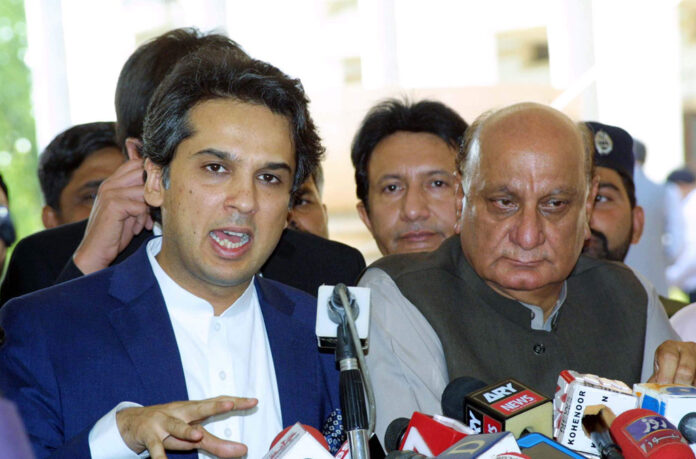LAHORE: Punjab Finance Minister Makhdoom Hashim Jawan Bakhat said on Tuesday that despite all odds and difficulties caused by the coronavirus pandemic, the government has managed to present a “business-friendly and progressive budget” for the fiscal year 2020-21.
In his post-budget press conference, the minister highlighted some key points of the next fiscal year’s budget, including a tax relief package; cut in government expenditure; economic stability and development; social protection and facilitation of deserving segments; human capital development; agriculture and food security, and public-private partnership.
“Like the federal government, the Punjab government also lowered its tax revenue targets, but it did not compromise on the pace of development, as development expenditures for FY21 will somehow be equal to the current year’s Annual Development Programme (ADP),” he stated.
The minister said that a tax relief package of more than Rs56 billion would be ensured in FY21 to facilitate the business sector and the people at large.
“Since we are still fighting the pandemic, the government has allocated an accumulative amount of Rs106 billion under various heads for measures pertaining to corona control,” he informed, adding that world economies were contracting rapidly due the adverse impact of the deadly virus.
Hashim Jawan claimed that the government had given equal weightage to the stakeholders’ budgetary proposals/suggestions, and that budgetary allocations were made only after considering the public opinion.
He said another pertinent factor of FY21 was the Framework for Rolling Expenditures (FRE) for distribution of funds/resources as per their ‘actual demand’ instead of traditional supply.
“We have named it FRE as the expenditures will be reviewed on a monthly basis. The step has been taken after considering the fact that Covid-19 is still eating up more funds on various counts, and funds will be released accordingly after assessing the need and then situation.”
Responding to reporters’ queries, he said the PTI government was following the policy of austerity and in this connection, supplementary grants worth Rs61 billion were rejected during FY20 alone, while the austerity committee also helped save Rs1.5 billion by reducing demands for grants from various departments.
Keeping in view the meagre resources in the presence of coronavirus challenges, the government has decided to involve the private sector through innovative financing to fulfil development needs, he said.
For this purpose, he added, Punjab Public-Private Partnership Authority has identified 165 mega projects, including the Lahore Ring Road (SL-4), for FY21.
Of the total Rs337 billion development budget, Rs97.66 billion would be spent on social sector, Rs77.86 billion on infrastructure development, Rs17.35 billion on production sector, Rs45.38 billion on services sector, Rs51.24 billion on miscellaneous sectors, Rs47.5 billion special programme and Rs25 billion on public-private partnership.
The provincial finance minister said that Rs15 billion were being allocated for the Community Development Programme (CDP) to initiate labour intensive programmes, while a hefty amount was also being earmarked for the ongoing projects under Sustainable Development Goals Achievement Programme (SAP).
He said the Punjab Social Protection Authority (PSPA) budget for FY21 would be around Rs4 billion, under which Punjab Ehsaas Programme (PEP) would be implemented. “Shelter homes are being constructed at every divisional headquarter for social welfare, while two new centres are being established at Lahore and Rawalpindi to curb violence against women.”
He said that poverty reduction and employment projects worth over Rs2 billion would be completed under the South Punjab Poverty Alleviation Programme (SPPAP) in ten districts. Similarly, Rs1.15 billion will be spent on Women Income Generation and Self Reliance (WINGS) Project in various districts.
Since the health sector is under extreme pressure due to Covid-19, he said that Rs13 billion had been allocated to control this pandemic, besides more than Rs26 billion for medicines’ procurement.
In order to improve the health sector’s service delivery, the minister said that a total of 12,000 vacancies of doctors and paramedical staff would be fulfilled. He mentioned that the scope of Sehat Insaaf Card had been extended to the entire province and five million cards have so far been distributed, while Rs12 billion has been allocated under this head for FY21.
Regarding the Orange Line project, he said the government has allocated Rs40 billion for this project, explaining that operations of this project without government subsidy would cost Rs250 to every passenger per trip.
The provincial finance minister said that the education sector would have a Rs34.55 billion development budget; the School Education Department (SED) would spend Rs27.6 billion on the development side.
He said that 20 per cent instead of 10 per cent rebate would be given upon payment of full registration and token tax of vehicles, and five per cent special discount would be given on online payment through e-Pay Portal.
“The Board of Revenue is eying Rs20 billion revenue from the lease of state lands, rental and sale, etc. under the Land Utilisation Policy. In this connection, amendments in Land Revenue Act, 1967, will soon be passed,” he added.




